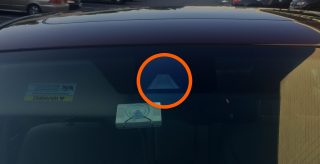Note: This is the first in a series of articles explaining some of the technical features of newer Honda and Toyota vehicles. We will explain, in plain English, how these highly complex systems work. Feel free to email us at moc.s1732349180krow-1732349180rotom1732349180@ofni1732349180 if you have any suggestions for things you’d like to learn about!

The Lane Departure Warning system alerts you when you drift over a lane line without signaling. Graphic courtesy of Honda.
What is it?
Lane Departure Warning, or LDW, is part of Honda’s “Sensing Package” (Toyota calls it “Lane Departure Alert“) available on most newer vehicles. The goal of this safety system is to keep you from drifting into another lane.
How it works…
 A camera on the windshield (right behind the rearview mirror) constantly watches the road in front of you. It detects the lane lines on the pavement. Above a certain speed (usually 35mph), if you cross a lane line without using your turn signal, the LDW system alerts you with a beep and a flashing indicator. The same camera is also used for other safety systems like Forward Collision Warning, Road Departure Mitigation, etc. (We’ll discuss these in future posts).
A camera on the windshield (right behind the rearview mirror) constantly watches the road in front of you. It detects the lane lines on the pavement. Above a certain speed (usually 35mph), if you cross a lane line without using your turn signal, the LDW system alerts you with a beep and a flashing indicator. The same camera is also used for other safety systems like Forward Collision Warning, Road Departure Mitigation, etc. (We’ll discuss these in future posts).
Interestingly Enough…
 A study by the Insurance Institute of Highway Safety in 2016 found that roughly 2/3 of Hondas equipped with LDW had the systems turned off by their owners. (The study was actually conducted at two dealerships in our area.) Why? Many owners find the lane departure alerts annoying and turn the system off.
A study by the Insurance Institute of Highway Safety in 2016 found that roughly 2/3 of Hondas equipped with LDW had the systems turned off by their owners. (The study was actually conducted at two dealerships in our area.) Why? Many owners find the lane departure alerts annoying and turn the system off.
You Should Know…
Since the LDW system operates by “looking” for lane lines, the system will have a hard time finding the lanes on a road with faded pavement markings. It also does not operate very well when the road is snow-covered. Driving into direct sunshine in the morning or evenings hours can also confuse the camera. Also, if the interior of the car gets too hot, the system will turn the camera off to protect the electronics from overheating, so on particularly hot days, the LDW system may not work for 10-15 minutes after starting up if your car was parked in the sun.
The Bottom Line…
While not all people believe these driver-assist technologies are helpful, these systems do indeed increase safety and ultimately save lives. Automakers have invested heavily in LDW and other similar technologies, so we expect to see rapid improvement in these systems over the next few years.
